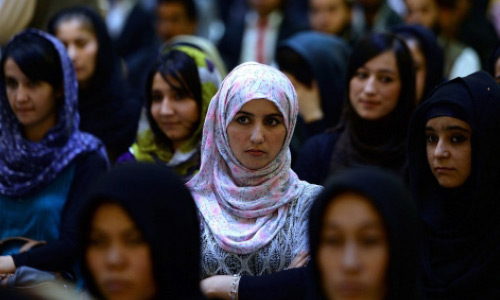KABUL - UN Deputy Secretary-General Amina Mohamed has said women have made significant progress in the past 18 years, making 27 percent of the civil service in Afghanistan.
Briefing UN Security Council members on Friday on her recent visit to Afghanistan, she said under the Taliban government, women and girls were denied access to education, health services and protection from extreme violence.
Similarly, they could not participate in political or public life, she recalled. But in the past 18 years, she noted, there had been significant progress. Women are in senior roles in the Defence, Foreign Affairs and Interior Ministries.
Critical elections are scheduled for September, and heads of the Independent Electoral Commission and Electoral Complaints Commission are both women, she said.
It is vital for the legitimacy of the political system that all stakeholders, including the Government, political leaders, candidates and parties, contribute to an enabling environment for a credible electoral process.
“As we witnessed again yesterday, conflict continues in Afghanistan. In 2018, the country suffered the highest number of civilian casualties since the United Nations Assistance Mission in Afghanistan (UNAMA) began recording figures in 2009,” the deputy secretary general said.
“In the first five months of this year, more than 100,000 people were displaced by conflict, and we know displacement increases the risk of gender-based violence. In areas where the Taliban have reclaimed control, there are reports of honour killings, stoning and other attacks on women’s rights. Peace, security and economic stability are urgently needed.”
The UN deputy secretary-general said: “During our visit, we heard a strong call from Afghan women for peace - but for peace that safeguards their hard-won rights and does not backtrack on what has been achieved. All the women we spoke to wanted an inclusive peace centered on women, as well as victims and survivors.
“In Bamiyan, we saw the incredible demining work that women are doing with the support of the United Nations, risking their lives alongside men to bring safety to their communities,” she said.
Inclusivity was the only way to make durable peace, she explained. One woman told the UN team: “It’s an illusion if you think that you are going to give away people’s rights, and then have any real peace.”
Afghanistan has made great progress for women since the fall of the Taliban. More than 3 million children are back in school, with 9 out of 11 million Afghan children now enrolled.
Investments in reducing maternal mortality were saving thousands of lives, she said. Improved infrastructure and power supplies are connecting remote areas to national economic opportunities including exports.
“We saw this in Bamiyan, where a provincial hospital is dispensing free world-class care to all people of Bamiyan Province and the neighbouring areas. This is possible thanks to an innovative partnership between the Government and the Aga Khan Foundation.”
She acknowledged Afghanistan had done more to invest in women’s leadership than many countries with greater means. Women, especially young women, are rising to reclaim their rightful place in all areas of society.
Many were quite simply inspiring, she remarked, One entrepreneur, who has created hundreds of jobs for women in a factory and a market, told her: “When we empower a woman, we empower a generation.”
The 2030 Agenda for Sustainable Development held great promise for the lives of Afghans across the country, the top UN official believed.
Twenty-four UN agencies are working in strategic partnership with the government in Kabul on issues from food security and clean water to the rule of law, often risking their lives.
The reform of the UN development system is enabling our Country Team to work in a more integrated way than ever before, responding to the President’s call to be more effective, efficient and responsive to country-led priorities.
Achieving Sustainable Development Goal 5 would be essential to ensure that women have access to education, health care and decent work, and that women are represented in all areas of society and in all political and economic decision-making processes.
Goal 16 on peace, justice and strong institutions will also be essential to hold free, fair and credible elections, to build trust in State institutions and to facilitate reconciliation and the reintegration of former combatants after the signing of any peace agreement.
In the short term, 6.3 million people need urgent humanitarian aid across Afghanistan and halfway through 2019, the Humanitarian Response plan is just 27 per cent funded.
“We must increase that level urgently, to provide immediate support and protection to displaced people and those in greatest need,” she continued.
Afghanistan was at an important crossroads, she said, hailing the government’s commitment to peace and upholding democratic rights of all Afghans.
Afghan women were currently playing a central role in creating peaceful, inclusive communities with opportunities for women and men, girls and boys, people with disabilities, victims and survivors of the conflict, Amina Mohamed said.
She added the Afghan women needed and deserved the support of the entire United Nations system and the international community to invest in building on those gains, while sustaining peace.
The voices of women, especially the victims, must be heard at the table in the peace process and beyond, the deputy secretary-general stressed.
“I am pleased to say that we are considering a significant investment in preventing and ending violence against women in Afghanistan through our joint Spotlight Initiative with the European Union.
“During our visit, my colleagues and I saw enormous grounds for hope. We left with great optimism for a better future for Afghanistan and its impressive people.
“I urge this council to do all in its power to support all Afghans in realising their hopes and aspirations for lasting peace, stability and prosperity.” (Pajhwok)
Home » Afghanistan » UN Hails Afghan Women’s Progress in Last 18 Years
UN Hails Afghan Women’s Progress in Last 18 Years

